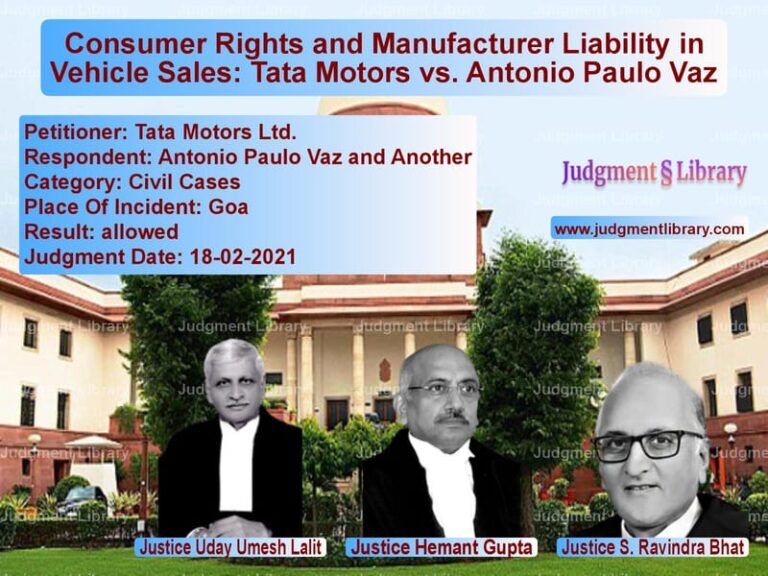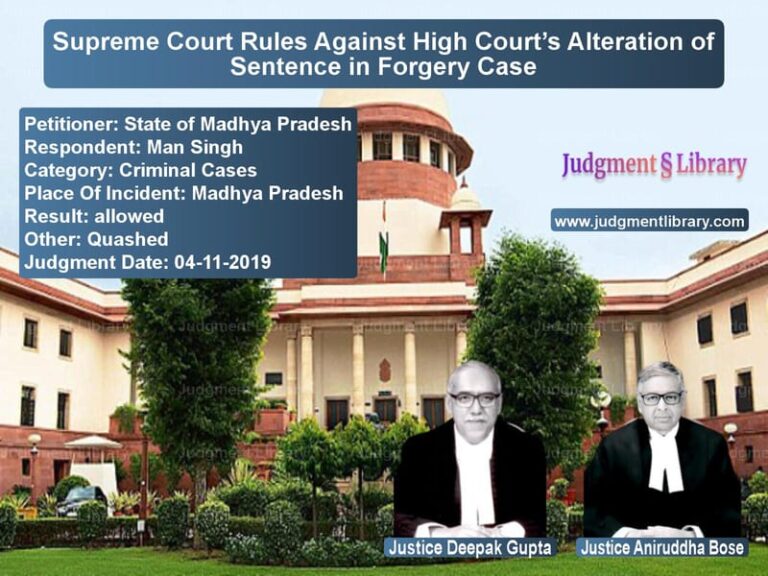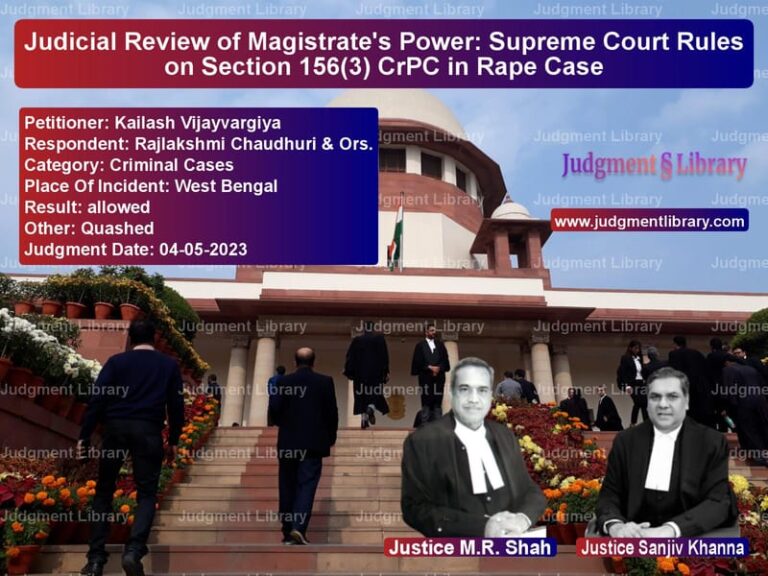Cheque Bounce Case: Supreme Court Convicts Accused Under Section 138 Negotiable Instruments Act
The Supreme Court of India, in the case of M/S Shree Daneshwari Traders vs. Sanjay Jain & Anr., ruled on a dispute concerning dishonored cheques under Section 138 of the Negotiable Instruments Act, 1881. The Court overturned the High Court’s decision and convicted the accused, emphasizing the statutory presumption under Section 139 of the Act and the burden of proof on the accused to rebut the claim.
Background of the Case
The case arose from a business transaction between the appellant, M/S Shree Daneshwari Traders, and the respondent, Sanjay Jain. The appellant, a merchant and commission agent, supplied commodities and rice bags to the respondent on credit. In return, the respondent issued multiple cheques as payment for the goods supplied.
However, when the appellant presented the cheques for clearance, they were dishonored due to insufficient funds. The appellant issued legal notices demanding payment, but the respondent failed to comply. Consequently, the appellant filed complaints under Section 138 of the Negotiable Instruments Act before the trial court.
The trial court acquitted the respondent, holding that the cheques were issued as security and that the respondent had already cleared the dues in cash. The High Court upheld the acquittal, leading the appellant to approach the Supreme Court.
Key Legal Issues
- Whether the presumption under Section 139 of the Negotiable Instruments Act was properly applied.
- Whether the respondent successfully rebutted the presumption that the cheques were issued for the discharge of a legally enforceable debt.
- Whether the lower courts erred in considering the defense of the accused without proper evidence.
Arguments by the Appellant (M/S Shree Daneshwari Traders)
The appellant contended:
- The cheques were issued in lieu of a legitimate business transaction where commodities were supplied on credit.
- The dishonor of cheques due to insufficient funds established an offense under Section 138 of the Negotiable Instruments Act.
- The respondent had not provided sufficient proof that he had already settled the dues in cash.
- The statutory presumption under Section 139 of the Act was not rebutted by the accused.
Arguments by the Respondent (Sanjay Jain)
The respondent countered:
- The cheques were issued only as security for future business transactions, not for a legally enforceable debt.
- He had already made payments in cash for the commodities purchased.
- Since the dues had been cleared, the appellant was misusing the cheques to initiate criminal proceedings.
Supreme Court’s Observations
1. Application of Section 139 Presumption
The Court ruled that once a cheque is issued and dishonored, the presumption under Section 139 of the Negotiable Instruments Act applies, shifting the burden of proof onto the accused. The Court noted:
“The presumption under Section 139 of the Act is mandatory and requires the accused to prove that the cheque was not issued for a legally enforceable debt.”
2. Failure of the Accused to Rebut the Presumption
The respondent produced receipts showing cash payments but failed to link them to the disputed transactions. The Court observed:
“The accused has failed to produce cogent evidence to rebut the presumption that the cheques were issued for a legally enforceable debt. The receipts produced do not conclusively establish that payments were made for the same goods covered by the dishonored cheques.”
3. Legal Standing of Security Cheques
The Court clarified that even if a cheque is issued as security, it can be enforced under Section 138 of the Negotiable Instruments Act if it was ultimately used to discharge a liability:
“A cheque issued as security does not automatically absolve the drawer from liability unless it is shown that no enforceable debt existed at the time of encashment.”
4. Role of Legal Notices
The Court emphasized that the respondent had received the legal notices but failed to make the required payments:
“The failure to respond to a legal notice demanding payment further supports the inference that the liability existed.”
Final Verdict
The Supreme Court ruled:
- The judgment of the High Court acquitting the respondent was set aside.
- The respondent was convicted under Section 138 of the Negotiable Instruments Act.
- The accused was sentenced to a fine of Rs. 2,97,150, payable to the appellant.
- In default of payment, the respondent would undergo six months of imprisonment.
Conclusion
This judgment reinforces the legal presumption in favor of the holder of a dishonored cheque. It establishes that merely claiming a cheque was issued as security is not enough to escape liability under Section 138 of the Negotiable Instruments Act. The ruling ensures that business transactions remain safeguarded and emphasizes the importance of honoring financial commitments.
Petitioner Name: M/S Shree Daneshwari Traders.Respondent Name: Sanjay Jain & Anr..Judgment By: Justice R. Banumathi, Justice A.S. Bopanna.Place Of Incident: Margao, Goa.Judgment Date: 21-08-2019.
Don’t miss out on the full details! Download the complete judgment in PDF format below and gain valuable insights instantly!
Download Judgment: MS Shree Daneshwari vs Sanjay Jain & Anr. Supreme Court of India Judgment Dated 21-08-2019.pdf
Direct Downlaod Judgment: Direct downlaod this Judgment
See all petitions in Cheque Dishonour Cases
See all petitions in Contract Disputes
See all petitions in Judgment by R. Banumathi
See all petitions in Judgment by A. S. Bopanna
See all petitions in allowed
See all petitions in Modified
See all petitions in supreme court of India judgments August 2019
See all petitions in 2019 judgments
See all posts in Civil Cases Category
See all allowed petitions in Civil Cases Category
See all Dismissed petitions in Civil Cases Category
See all partially allowed petitions in Civil Cases Category







